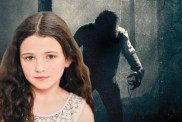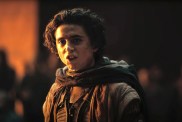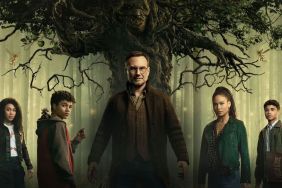Although Oscar-nominated writer and director Chris Weitz is known for his work in romantic comedies such as About a Boy and In Good Company, he took on the daunting task of not only directing, but also writing New Line Cinema’s fantasy-adventure The Golden Compass. He is the first to admit he didn’t have much experience with special effects and CGI, and therefore was apprehensive to take on such a film, but he admitted to us that he’s a true fan of the Philip Pullman’s “His Dark Materials” trilogy and couldn’t pass up the chance to be involved.
ComingSoon.net caught up with Weitz in London where he talked to us about the challenging process of making this film as well as his upcoming projects.
ComingSoon.net: This is a huge project for you. Why did you feel so passionate about this and you actually quit at one point and came back, right?
Chris Weitz: Yeah, I did. Well, I felt very passionate about it because I love the books. I read the books for pleasure not with a mind towards making a movie in the first place. And they quickly became some of my favorite books. And Philip is kind of a literary hero to me. I think that they’re some of the greatest works of the end of the last century. And so that’s why I did it. Why I quit briefly, was because it was obvious. It was kind of a little knowledge of a dangerous thing. I went to New Zealand and checked out Peter Jackson’s facilities there. And met all of his prop master and the effects people and did some motion capture stuff. And I learned enough to know how little I knew and how for the next three years of my life I was going to be in this, this very unfamiliar world. And at the time I was single and I thought “well I’m just not going to have a life for three years and at the end of I’ll be kind of spat out at the other end.” And God knows what’ll have happened by then. So I backed away. But a few months later the opportunity came again and I just couldn’t turn it down.
CS: What did you learn from this process that surprised you?
Weitz: I think the thing that surprises me most is that directors like myself who are used to directing actors walking around and sitting on their butts and talking can become very scornful about VFX. That they were just a bunch of computers and things blowing up and giant robots and that sort of stuff. But actually there’s a tremendous amount of arts and artifice brought to these details. That the animators are like actors and the amount of attention paid to the aesthetic of this aspect of the filmmaking is really extraordinary and impressive.
CS: Kate Bush is heard over the end credits. How did you get her to come on the project?
Weitz: No, I just lucked out because she’s a friend of Philip Pullman’s and a fan of the book. In many cases in this film I lucked out completely because people love the books. Nicole [Kidman] and Daniel [Craig] wanted to do the movie because of Philip, not because of me. (Laughs) I just, I’m along for the ride.
CS: That’s sad.
Weitz: No, at least I didn’t frighten them off, let’s put it that way. And so that, the books had held a fascination for a lot of people and drew a lot of talent and it’s responsible for the extraordinary cast we were able to assemble.
CS: Can you talk about the ending of the movie? What’s the story about the ending you shot and didn’t use? Is it going to be in the next movie or is it out completely?
Weitz: I intend for it to be used in the next film because I wanted to protect it, really. We shot the last three chapters of the book which are really quite ambiguous in their ending and quite harsh and dark. It became clear that audiences who weren’t familiar with the books were both confused and a bit appalled by the end of this movie and in order to protect the character of these last three chapters I thought well it can work at the beginning of the second movie, but I’m going to get a lot of pressure to kind of pretty it up for the ending of the first movie. So in a way, deciding to kind of leave it as a cliffhanger was a way of kind of protecting the spirit of the book. And anyway, to me Pullman would say he’s telling one story, it’s Lyra’s story throughout the whole thing. It didn’t particularly matter where one movie ended or where the other one goes, it’s disappointing to fans because they want to see as much as possible. They want to think of it in terms of one movie per book but, you know, having spoken to Pullman about it I don’t think he was terribly concerned.
CS: How big of a gamble is that there in the event of the film doesn’t do well and you have the most expensive DVD extra ever made?
Weitz: Well it’s not like we’re going to loose any less money if people don’t go see the movie. So yes, that’s a gamble but the whole undertaking has been a huge gamble on the part of New Line’s: the most expensive film they’ve ever made because things have become so much more expensive between the making of “Lord of the Rings” and this one that I felt that this was the ending that provided the best kind of financial framework on which to shoot the next two.
CS: You cut the film with the ending that’s in the book…
Weitz: Correct.
CS: And you screened that and after the reaction you re-cut.
Weitz: Yes, yeah. You have to remember that the ideal audience for this film has to be much larger than the number of people who are familiar with the books and the audience members who hadn’t read the books were often confused by the ending, “Did Lyra go to Heaven?” I think that the difference between the media also accounts for it. That a novelistic ending to a novel can be quite lovely and kind of plangent and beautiful. And the last sentence of the first book is absolutely beautiful. But there is no last sentence per se in the movie. It’s a last image and what you show in there could be either very confusing and avant garde or it can be a person walking off into nothingness or you show where she goes to which then makes it quite sort of specific and fully realized. It was a challenging decision to make but I’ll stand by it.
CS: Are you free to give a budget?
Weitz: Am I free? To be completely honest with you I don’t know the final budget of the film. At one point I did when it was all about getting the budget down to size but eventually you have to consider that, you know, special effects guys are being flown in from Los Angeles to be put to work twenty-four hours a day and stuff. Around two hundred million would be a fair estimate.
CS: Setting aside your director’s hat for a moment – how much of a challenge was the adaptation and how tricky was the exposition?
Weitz: Good questions, both of them. Yeah, it’s a big challenge. It’s a bigger challenge to adapt something that you care about than something that you don’t. And it’s a bigger challenge to adapt a good book than a bad book because in a good book you want to preserve as much as possible. In a bad book, you know exactly what to throw out. (Laughter) So as a fan as well there are all these wonderful scenes in the book that didn’t necessarily move the plot forward in a cinematic sort of way and so deciding which of those would have to go and what kind of allusions and composition to make is very tough. And in terms of exposition you’ve got a world of incredible sort of complexity with rules that are very complicated and I hate expositional writing and the key is to try and be as elegant as possible about expressing the rules of this world. And yes we had a prologue but we tried to make it as short as possible in terms of explaining as few things as possible for an audience that wasn’t familiar with the books.
CS: How helpful was it that you were both the writer and director?
Weitz: That’s a mind-bending question. I suppose that there’s a give-and-take because the director has to win some arguments because the writer can write some things which aren’t filmable. There’s a thousand Indians coming over a hill and there is the visual effects equivalent of that. There’s the creation of the universe which one would like to start the movie with in some ways and you’re constantly balancing the visual form that I’d like to have with what is really the best use of your resources. So for instance, any scene with a thousand people, each of them with a daemon, is, you know, extraordinarily costly so you have to be careful about when you do that sort of thing.
CS: Were you there when Pullman saw the film?
Weitz: I wasn’t present when Philip saw the film. That probably would’ve been bad for my heart (Laughter)
CS: You must’ve been very anxious to hear what he thought of it.
Weitz: Yeah, and he likes it very much – at least that’s what he told me. (Laughs) You know he’s a very gracious guy. The reason I say, “That’s what he said to me” is the next door neighbor is this fellow and I’m sure you would find something nice to say to me.
CS: How much time were you committing yourself to for this – if it all goes ahead and you.
Weitz: Right. We’ll find out pretty much whether it’s a going concern. It depends on how the first one does. Although we’re reasonably confident.
CS: Would you object to then try and do the next two simultaneous?
Weitz: I think that would be the way to do it, yeah, absolutely. There would be no point in stopping between the two productions, you’d do it as one massive…
CS: And also I’m sure you’d want to start filming before Dakota grows up too much.
Weitz: Right. Well I think it’s rather good that Dakota will have grown up a bit between this first film and the second because there’s sort of a love story that’s introduced and I think it doesn’t hurt us that she’ll become a bit more mature in the meanwhile. But yes, I think that the events of the second and third book kind of take place in a single continuity.
Weitz: How did you find Dakota?
Weitz: Well, literally there was an open casting call in several cities. I knew that we wanted an English girl and that we’d probably be using an unknown. And she emerged out of the thousands of girls who went on tape. She was just very strong.
CS: We’ve been told that there were attempts to water down the references to the Roman Catholic Church so can you talk about that aspect?
Weitz: Yeah, well I always sort of knew that I’d be stuck between a rock and a hard place. Between fans worried about the books being watered down and religious people worried that the books are a sort of recruiting poster for atheism, which I don’t think that they are. Philip is an atheist but I don’t think that “His Dark Materials” are an aggressive attack on either the Catholic Church or religion.
CS: What about C.S. Lewis and the “Narnia Chronicles?”
Weitz: He doesn’t like C.S. Lewis (Laughter). But, he’s spoken to that. I wasn’t a big fan of “Narnia” because even when I was a child I thought I was being sold something. I thought something curious was going on, that something was a bit fishy. Which is exactly why I wouldn’t really want to make this movie as any kind of “hidden message” film. Now I did take out the use of the word “Church” as the bad guy because even though in Pullman’s alternate universe they used the word “Church” to define the Magisterium. To me in the condensation of a movie and of its message, it would unnecessarily offend religious people who might go and see the film. I think the film, just like the books, still has an issue with religion or God abused in order to gain political power, but to me the closest thing to that is the theocracy in Iran, not any of the churches that exist in today’s world. That’s kind of my feeling on that.
CS: Your brother is working on “Cirque du Freak,” what is your role going to be on there? And has he learned anything you think from watching you work on “Golden Compass?”
Weitz: (Laughing) He does ask me about special effects, like what are they. (Laughter) Yeah, I think my role on that will be to try to help him as much as I can in the very sort of steep learning curve of being a non-special effects director entering into that world and to try to give him the benefit of my occasionally painful experience learning about all this stuff.
CS: He’s writing or are you?
Weitz: Yeah, if he lets me. No he’s written the script so I won’t be a co-writer. I think my best function would be as a visual effects advisor. I mean all degrees of special effects, I’m now like I guess one of the twenty or so people who’ve been through this kind of insane process and learned at the feet of some really great special effects people like Mike Fink, who’s an extraordinarily talented and experienced special effects supervisor.
CS: Did you enjoy the experience or would you, do miss those sort of days of…
Weitz: It’s so much easier to just shoot a scene with actors in a room, so much easier. But the experience of being able to manipulate the frame as much as you can with digital tools is a really wonderful feeling.
CS: Do you still have the rights to Michael Moorcock’s book?
Weitz: Yes, I do. We still have the rights to the “The Elric Chronicles.” I think that now I know enough to know how to get it made. I’m very excited about doing that because Michael’s been very patient with us and we’re going to do it for him.
CS: When do you think you’re going to work it into your schedule?
Weitz: Well, I mean as soon as I get back to L.A. we’re going to look for a director for it.
The Golden Compass opens in theaters on December 7.










